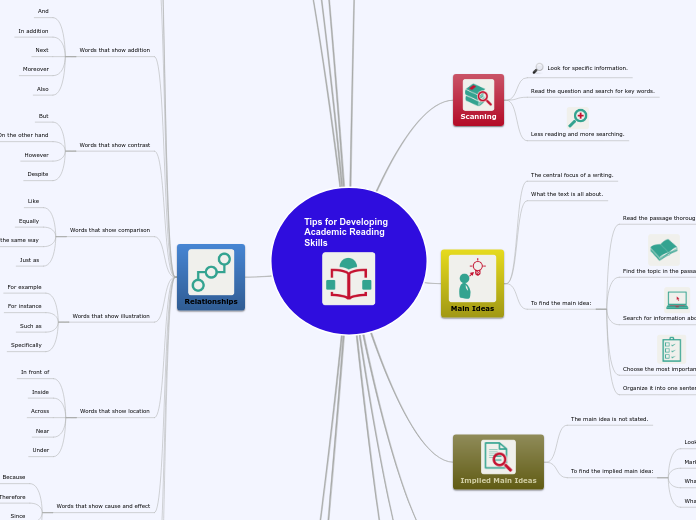作者:naira vanesa 6 年以前
259
Tips for Developing Academic Reading Skills

Tips for Developing Academic Reading Skills
Critical Reading
To read critically you need:
Recognizing erors in reasoning
Detecting propaganda
Separating fact from opinion
An opinion
It can not be proved true.
A judgment
A belief
A fact
It can be proved true.
Purpose and Tone
Purpose
It will drive the main idea:
To persuade
To entertain
To inform
The author's reason for writing.
Tone
Subjective tone
Opinions
Feelings
Objective tone
Reasonable explanations
The author's attitude toward the topic.
Relationships
Words that clarify
Evidently
To be sure
In fact
Of course
Words that summarize or conclude
In other words
In brief
In conclusion
In summary
Words that show cause and effect
As a result
Since
Therefore
Because
Words that show location
Under
Near
Across
Inside
In front of
Words that show illustration
Specifically
Such as
For instance
For example
Words that show comparison
Just as
In the same way
Equally
Like
Words that show contrast
Despite
However
On the other hand
But
Words that show addition
Also
Moreover
In addition
And
Words that show time
Now
After
Often
Then
Next
First
Transitions
It shows the connections between ideas.
It makes the ideas clear.
Supporting Details
They are marked by addition words.
Explain a main idea.
Examples
Reasons
Facts
Semantic Mapping
It includes categories and examples.
It includes the concept word.
Visual strategy
Extension of knowledge
Vocabulary expasion
Skimming
Look for topic sentence
Look for keywords
To do skimming you should
Read the first and last sentence of each sentence.
Look at the ilustrations.
Read the title, subtitles and subheadings.
Identify the main idea.
Active reading and study
Strategies
Visualizing
Evaluating
Reviewing
Predicting
Connecting
Questioning
Ask yourself
What is the support for the point?
What is the point?
Argumentation
Evidence to supporting a point of view.
Reasons plausible
Cite examples
Cite sources
Support a point of view about some matter.
A rational discussion.
Inferences
To make inferences in reading:
Consider the alternatives.
Use your background information.
Never lose sight of the available information.
Ideas that are not stated directly.
Implied Main Ideas
To find the implied main idea:
What point is being made about the topic?
What is the topic of those details?
Mark major supporting details.
Look for repeated words.
The main idea is not stated.
Main Ideas
To find the main idea:
Organize it into one sentence.
Choose the most important details.
Search for information about the topic.
Find the topic in the passage.
Read the passage thoroughly.
What the text is all about.
The central focus of a writing.
Scanning
Less reading and more searching.
Read the question and search for key words.
Look for specific information.
Pre-viewing (before you read)
KWL
What did I learn?
What do I want to learn?
What do I know?
Purpose for reading
Focus your attention
Author consideration
Reason for writing
Point of view
Vocabulary previews
Learn unfamiliar keywords
Overviews
Discuse information about the assignment.
Visual Aids
Search for pictures related to your tittle.
Pre-questions
Questions you expect to be answered.
Brainstorming
List the information about title.

